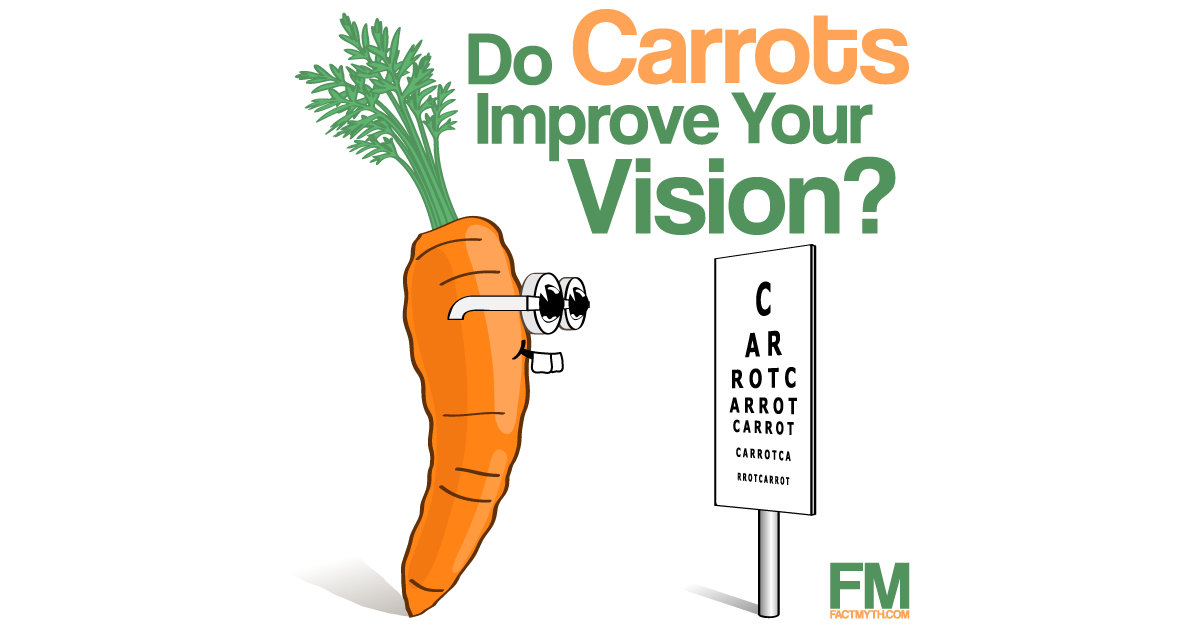Carrots can improve your vision, but like most vegetables and such, the vitamins and minerals (micronutrients) are most helpful when one is vitamin deficient.
Carrots Improve Your Vision fact

Do Carrots Improve Your Vision?
Carrots can improve your vision if your body is deficient in vitamin A, but the popularity of carrots has more to do with a food shortage during WWII than beta-carotene. Carrots are simply a cheap and easy to grow source of vitamin A, most natural foods contain beta-carotene (including animal-based food).
How Does Beta-carotene Help Improve Eyesight?
The beta-carotene in carrots is converted to vitamin A in the body, which helps the eye signal the brain, particularly in low light conditions. Under extreme conditions of vitamin A deficiency, blindness can result from damage to the cornea. If the body’s deficiency is reversed, damage to vision can often be reversed. [1]
Do Carrots Really Give You Better Eyesight?
Victory gardens were promoted during WWII. The carrot was a popular and easy to grow vegetable at the time.
Why Do So Many People Think That Carrots Help your Vision?
The belief that carrots help night vision is a creation of British World War II propaganda. There were food shortages during the war, and much food was scarce. People who had access to land were encouraged to grow vegetables, and one of the vegetables easiest to grow in Britain was the carrot. Since carrots were not a very popular food, and was typically reserved for farm animals, the problem became one of marketing. The British government needed to sell the idea that carrots were healthy and beneficial to the public. [2]
U.K. Ministry of Food developed an advertising campaign in which they attributed British pilots’ ability to shoot accurately at night to carrots, and not to their developing radar systems. Also, as sugar became scarcer, the sweetness of cooked carrots lent itself to such bizarre creation as carrot lollipops, which were cooked carrots on a stick. It became positive patriotic to find new ways to use carrots. When the United States entered the war, they joined in the campaign. Even Walt Disney contributed.[3]
Wartime Nutrition (1943) – World War II Allied Propaganda. Eat your peas and carrots! Saying your mom and government were lying about carrots is a little cynical, but saying “the carrot craze” is only rooted in vitamin content is probably a misreading of history.Is Eating Carrots the Best Way to Improve Vision if you are Vitamin A Deficient?
Carrots are one of the plants highest in beta-carotene, second only to sweet potatoes, but they are far from the only source of vitamin A or beta-carotene. Carrots are simply an inexpensive and easy to grow plant-based source of vitamin A.[4]
It’s likely meat is a better source of vitamin A, as animal-based sources can provide retinol. Retinol can be used directly by the body, and does not need to be synthesized from beta-carotene.
Other plants like spinach, kale, and collard greens contain beta-carotene, but additionally contain lutein and zeaxanthin, nutrients that are usually in higher concentrations in the eye than beta-carotene and help protect your eyes from damaging wavelengths of light. [5]
What Foods are High in Beta-carotene / Vitamin A?
As noted above, most foods actually contain beta-carotene including both plant-based and animal-based sources.
- Animal-based sources of vitamin A include chicken or beef liver, milk, and cheese.
- Plant-based sources of vitamin A (typically with an orange color, but not always) include sweet potatoes, cantaloupes, pumpkins, peas, broccoli, spinach, kale, collard greens, and more.
FACT: The curative powers of vitamin A in cases of deficiency have been known for a long time. The ancient Egyptians had treatment for poor night vision that involved using the juice of grilled liver as an eye drop and then feeding the liver to the patient.
What Does Vitamin A Do?
Vitamin A has several medical uses in connection with retinal degeneration. Drops containing A have been found to be as effective in treating dry eyes as expensive prescription formulas. Vitamin A helps to treat some eye inflammations; slowing macular degeneration when take in combinations with C, E, zinc, and copper; slowing the loss of peripheral vision in individuals with retinitis pigmentosa if taken in combination with lutein; and possibly slowing the progression of Stargardt’s disease in young people if used in a slightly altered form.[6] However, eating carrots will not help most people who eat a balanced diet since they will already have enough of the vitamin.
What does beta-carotene do? A look at beta-carotene’s curative properties.Should I take Vitamin Supplements?
In general, vitamins are good if you are vitamin deficient, but some can be dangerous if you aren’t.
If your body has enough vitamin A, taking more can be bad for you. If you eat too many carrots, your body might take on an orange coloring, but too much vitamin A taken in supplement form can cause problems with vision as well as dry, damaged skin, hair, bones, and nails. An overdose of A may also cause headaches and, in extreme cases, enlargement of the spleen or liver.
- “Fact or Fiction? Carrots Improve Your Vision” Scientificamerican.com
- “A WWII Propaganda Campaign Popularized the Myth That Carrots Help You See in the Dark” Smithsonianmag.com
- “The World Carrot Museum” carrotmuseum.co.uk
- “Vitamin A and Beta Carotene: Eye Benefits” Allaboutvision.com
- “Nutrition and Glaucoma” Glaucoma.org
- “Carrot Juice” Naturalhealth365.com
For more information on Disney’s involvement with the carrot campaign see “DISNEY TO THE FRONT“.
